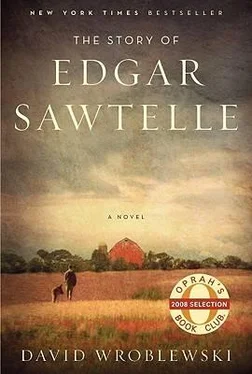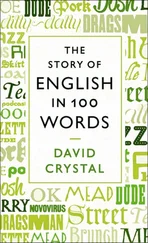Edgar hesitated.
“Get going,” Claude said. “Before she decides to cut through that way.”
Edgar turned and rounded the stony circumference, passing briefly back into the light before he reached the thick cement pier a foot high and three feet wide that connected the barn foundation to the silo. Through the gap he could see the dog house and the kennel runs beyond and the dogs standing in them, watching. Meltwater from the roof had rotted a line into the crystallized snowpack beneath the eaves.
Epi stood stock still, fixated on Claude. Edgar crouched on the cement pier, ready to intercept her if she bolted his way.
HOW IT GOT STARTED even Claude didn’t remember. There must have been some first time in the kennel, some formative moment, when a pup had injured itself and backed into a corner, scared and defensive, and Claude had stepped past everyone to somehow enchant it, which was the only word for what he could do. He knew instinctively how to approach, how to touch, how to confuse and distract, so that, fearful or not, the dog found itself acquiescing. Maybe that first time had happened when he was very young. In any case, it was something he’d known how to do all of his life.
In high school, Claude began working afternoons and weekends at Doctor Papineau’s shop. At first, it was odd jobs-clean up, repair, filing, walking the convalescent dogs. He liked the antiseptic smell of the place and the rows of prescription drugs on the shelves, like bottles of magic. When animals needed their dressings changed, he helped with that, too, asking many questions, which flattered the veterinarian, and seldom forgetting the answers, which impressed him. In time, Claude persuaded Doctor Papineau to let him assist on minor surgeries. The veterinarian showed him how to administer intramuscular injections of sedative, as well as the older skill-waning even then in veterinary practice-of the ether drip.
Occasionally, a dog came in wild with fright. Doctor Papineau had a noose pole for such situations, but people hated seeing it used, and Claude learned to work without it, crawling into the back of the truck-or wherever the frantic dog hid-and emerging with a docile animal and an empty syringe. He was bitten more than once, but they were fear bites, quick and shallow, and Claude had excellent reflexes. He became a masterful judge of how far a dog could be pushed. And eventually he craved the thrill of those moments more than anything.
On Sunday afternoons, when the shop was closed, Claude cleaned up and administered medications by himself; he knew where to call Doctor Papineau in case of an emergency. And if, on those Sundays, a dog was boarded that Claude had taken a dislike to, when he was done with his work he let it out to run the halls. Then he jimmied Doctor Papineau’s desk for the key to the pharmacy room, prepared whichever method of sedation most interested him that day, and began to search. Once the dog was unconscious, he carried it to its pen and checked his watch. Both methods had their uses, he decided, but he was faster and more adept with the needle.
Though not perfect. Doctor Papineau attributed the first dog’s death to post-surgical trauma. The second dog, however, puzzled the veterinarian. He’d questioned Claude for a long time about the dog’s condition that Sunday. The session had left Claude shaken, and after that, there were no more incidents at the shop.
Late night, autumn 1947. Claude was leaning against the wall at the back of a long-abandoned barn, watching the crowd, all men, disperse into the cool night. A few of the men led dogs muzzled and close-leashed against their thighs. A few more stood cocooned in silence and disappointment. A man counted out money into another’s hand. The roughshod plywood ring had been dismantled already and under the light of two white gas lanterns someone was pitching water across the boards to rinse the blood away. Outside, bitter laughter, black undercurrent of animosity. An argument followed, quickly shouted down.
Then Gar appeared, shouldering his way inside. He blinked at the glare of the lanterns. He was about to leave when he spotted Claude and walked over, glowering.
“Come on,” he said. “We’re leaving.”
“I got myself here. I can get myself home.”
“If you leave the house with me, you’re damn well going to walk back in with me. The only thing I want to know right now is whether any of our dogs were here.”
“No.”
“Tell me which dogs.”
“I said no. Why do you think I’m here, anyway?”
“I don’t know why you’re here. That’s what we’re going to talk about after we leave.”
Then a man trotted into the barn. “Hey, Doc,” he called, waving Claude forward. Gar looked at Claude and then at the men cleaning the plywood. Claude had kicked the satchel behind him when his brother walked in, but Gar spotted it anyway. He picked it up. He looked at the initials embossed on the top. Then he opened it and looked inside.
“You’re kidding me,” he said. “You patch them up afterward? Is that the idea?”
The man called again, this time more urgently. Claude started to take the satchel, but Gar pushed him back against the beam.
“Wait here,” he said. He walked over to the man. Claude couldn’t hear the conversation but he saw Gar shaking his head. The man cradled his arm in front of him and pointed off somewhere. Gar shook his head again. Finally he turned and motioned to Claude and the three of them walked out of the barn, Claude carrying the satchel. Out on the road, motors started and tires rolled over gravel and the beams of headlights swung cross-eyed through the trees. Claude could see the bite punctures in the corded muscles of the man’s forearm.
A shaggy shepherd cross with a stocky build and a blunt muzzle was chained to a tree near the road. As they approached, the dog hobbled to its feet and began to bay, one bloody hind leg held off the ground.
“Knock it off!” the man shouted.
The dog licked its chops and limped forward. The owner sidled up to it, but the moment he tried to slip an arm under its flanks, the animal set his muzzle beside the man’s ear. Even from where Claude stood, the baleful rumble in the dog’s throat was unmistakable.
“See?” the man said, backing away. “He was okay when we first got out here. Now I can’t get him in the truck.”
Gar looked at Claude. “You can tranquilize him?”
Claude nodded.
Gar guided the man back a few paces. Claude set the satchel on the ground and opened the jawed top and pulled out a bottle and a syringe. He drew fluid into the syringe. Then he walked to a point just beyond the reach of the dog’s chain and whistled a warbly double-tone-tweee, tweee.
The dog tipped its head, curious.
NOW, IN THE DARK behind the barn, Claude had turned sideways to Epi. He kept his gaze averted, elbows pressed to his sides, knees bent, trying to minimize his profile as he crabbed toward her with a slow side shuffle. He was mumbling a monotone stream of nonsense, the words an endless, senseless flow of noise. “Say, honey,” he said. “Such a good girl. Goodness gracious. Such a sweetie pie.” He held the plastic bag crumpled against his far hip, and something metallic glinted in his hand. He moved a foot closer, then paused, his delay just long enough that he seemed to be drifting pointlessly inward, every gesture slight and contained and almost accidental so that he hardly seemed to be moving at all, never a direct glance, never a raised voice, but closer, always closer, and always the steady meaningless patter.
Epi retreated toward the empty dog house, looking wide-eyed across her flank. She knew she was trapped, and she turned to look at Edgar. He thought she might decide to come to him, but the howls and the flashing teeth and the desire to flee overwhelmed all else in her mind and she froze. Edgar raised his hand to sign a down. She saw him and turned back to Claude and lowered her head miserably, mouth closed up, ears flattened. The gash on her face was black and wet and she dragged a paw across the cut and sank to the cold snow and tucked her feet up tight beneath her. She sized up ways past Claude. When he was three small side steps away from her, she retreated into the dog house and, shortly, a low growl emanated from inside.
Читать дальше
Конец ознакомительного отрывка
Купить книгу












